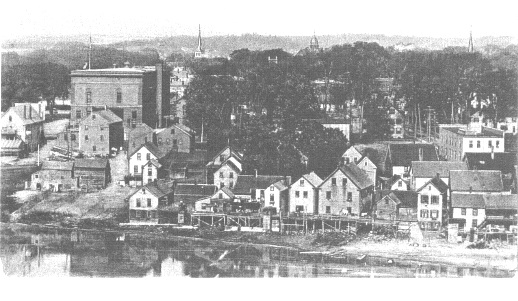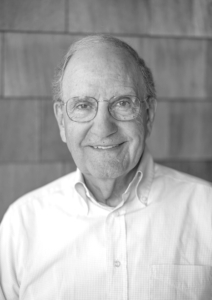SOLON & BEYOND: The day we had to abandon our homes in the name of progress
 by Marilyn Rogers-Bull & Percy
by Marilyn Rogers-Bull & Percy
grams29@tds.net
Solon, Maine 04979
Good morning, dear friends. Don’t worry, be happy!
It has been awhile since I sat down at this computer (I had threatened to trash it from all the problems it had given me )….. But thanks to Peter it is up and running again!
As those of you know who read this column, I am very against the CMP Corridor……. and I have managed to get a few printed to the editor of the daily paper. A lot of that is due to the fact that I can remember when we had to sell our homes and move from Flagstaff (it was a very upsetting time for many of us). But……I can also remember how happy I was when Roland and I did the four part series called The Burial of Flagstaff. The following is from the first one in the series: “Like all progress, it will not be accompanied without some heartaches, for the waters to be backed up by the dam will cover the land on which is now located the little community of Flagstaff.”
Twenty-two years ago, I asked John Alden, editor of the Somerset Reporter, if he would print a story about Flagstaff. He had never heard of the place, but he did print the article which included parts of newspaper clippings of the building of the dam that flooded the area – 1949 was the year many of us headed out to a new adventure after living in Flagstaff and Dead River our entire lives.
I wonder what my life would have been like if 35 years ago we hadn’t been ordered from our homes in Flagstaff and Dead River by Central Maine Power Co. Did you ever stop to think what it would be like not to be able to go back home-town?
Like all progress , it will not be accompanied without some heartaches, for the waters to be backed up by the dam will cover the land on which is now located the the little community of Flagstaff.
In the Waterville Morning Sentinel, Tues., July 5, 1949, Eva Bachelder wrote:
The Rev. Arthur R. Macdougall Jr. called what was perhaps Maine’s most solemn Independence Day a “seeming burial.”
At this seeming burial of your little village, Rev. Macdougall said, “You the people of Flagstaff, can broadcast for all to hear that you have lived in one of Maine’s small villages beside a river, surrounded by mountains…a place where there was room to live and to work and to own ones acre… that you have the dignity of everyday freedom the like of which there is no wealth or treasure to compare.”
The words above are all taken from the first week of this four part article written by Roland and myself, Marilyn Rogers, before I became a Bull.
It continues: “I finally went back to where Flagstaff used to be … and the peace and tranquility were still there; and the strength of Mt. Bigelow towering in the distance was as comforting as it had always been in my childhood years.
Would the pace of modern-day living have reached Flagstaff? Some of us didn’t have electricity or plumbing, and yet I don’t feel underprivileged because of the pleasant memories I treasure.
The skiing and sliding on Jim Eaton Hill, skating on Flagstaff Pond in winter and swimming in summer. Everyone turned out for school socials and plays. It was a wonderful place to grow up in. But all during my childhood, every so often during the grown ups conversations, mention was made of a dam being built and having to move. The thought was intolerable, and yet it did come to pass, and in the fall of 1949 the people of Flagstaff and Dead River sadly went their separate ways..
Any homeowner, deep rooted in his own community and neighborhood, with many long-time friends, can easily realize the feelings of those about to be dispossessed. It may not be much consolation to say that the flooding of Flagstaff and Dead River is part of the price of progress long paid in the history of our national growth. First it was the Indians, who were driven off their lands to make way for the white man. At intervals since others have had to sacrifice for the benefit of the majority.”
Like all progress, it will not be accompanied without some heartaches, for the waters to be backed up by the dam will cover the land on which is now located the little community of Flagstaff. (Some of the above was printed in the Lewiston Daily Sun on July 1, 1948.)
This first article was called The Price of Progress, by Roland Hallee and Marilyn Rogers. Tucked away diagonally east of both Eustis and Stratton, in Somerset County, was once a small hamlet known as Flagstaff. The tiny village was located in a low lying area which the Dead River snaked through. Off in the distance could be seen majestic Bigelow Mountain. It was a post card picturesque community.
It received its name from the fact that Benedict Arnold on his way to attack Québec City in 1775, encamped there with his forces. They chose a tall juniper tree and created a flag pole to fly the national standard on that site. Until the demise of the town in 1950, a flagstaff always marked the spot.
Legend has it, according to family records of Isaiah Taylor and wife, that “six families had cleared land and built log houses, then came the big freshet of 1831, water coming into the houses causing the families to leave their homes and going to John Berry’s on high land. One man with a broken leg lay in his bed when Isaiah Taylor paddled right into his bedside, taking him and his bed into his log boat, and carrying them to a place safely on high land.” The log boat referred to was a hollowed tree.
It ends with this remark from guess who? Marilyn’s final comment in that article was: “With the price of electricity climbing steadily, will someone please tell me how high is the price for this thing called progress?”




 To the editor:
To the editor:




 The older people get, the less likely they are to share memories, researchers say.
The older people get, the less likely they are to share memories, researchers say.

 An owl is a wise bird: Fiction – Some people think owls look wise because of their eyes. But for a bird its size, the owl has a tiny brain. An owl never moves its eyes to look for prey, but, instead, moves its whole head from side to side.
An owl is a wise bird: Fiction – Some people think owls look wise because of their eyes. But for a bird its size, the owl has a tiny brain. An owl never moves its eyes to look for prey, but, instead, moves its whole head from side to side. Rats desert a sinking ship: Fact – Rats will jump overboard if a ship is sinking. But that is true of any animal that can swim. Rats sometimes desert a ship even if it isn’t sinking. In the days of sailing ships, it was a common sight to see packs of rats jumping overboard. The ships were slow and would be at sea for months. By the time they returned to port, there was little food left for the rats so when the ship came close to shore, they would dive overboard and swim to land in search of food.
Rats desert a sinking ship: Fact – Rats will jump overboard if a ship is sinking. But that is true of any animal that can swim. Rats sometimes desert a ship even if it isn’t sinking. In the days of sailing ships, it was a common sight to see packs of rats jumping overboard. The ships were slow and would be at sea for months. By the time they returned to port, there was little food left for the rats so when the ship came close to shore, they would dive overboard and swim to land in search of food.